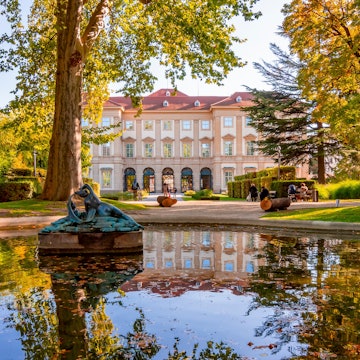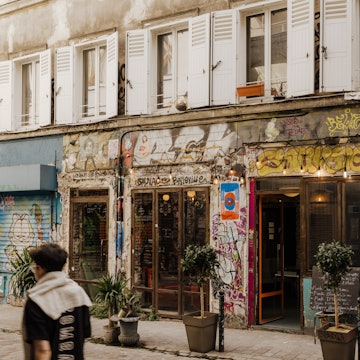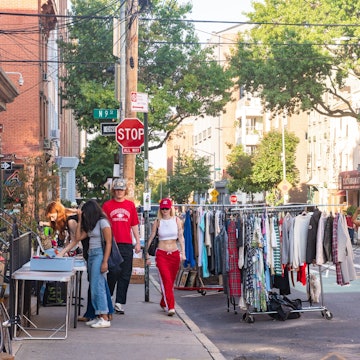
Bands and battlefields are keeping the last washboard factory alive

Oct 24, 2019 • 5 min read

Not only does the Columbus Washboard Factory manufacture the classic laundry tool, it's also home to the world's largest washboard, which hangs from the building exterior. © Laura Watilo Blake / Lonely Planet
We bring home more than just memories and souvenirs from our travels. We bring home dirty clothes that speak—and smell—volumes about where we’ve been and what kind of adventures we’ve had. Those of us in a developed country will likely throw our filthy threads in the washing machine and walk away, taking for granted a modern convenience that has transformed laundering from back-breaking grunt work to a mere inconvenience.
Long before mechanization and technology rendered it nearly obsolete, the simple washboard reigned supreme as the essential tool for getting fabrics clean. Its rigid sheet of crimped metal helps massage dirt from cloth fibers with the help of soap, water and extended hours of scrubbing.
While you’re likely to find these grime-fighting heroes in a museum or antique store, washboards are not relics of the past at the Columbus Washboard Company. The last remaining washboard factory in the United States, founded in 1895, continues to manufacturer these dynamos of dirty duds in Logan, Ohio, a small town at the edge of Appalachia in a scenic, southeastern portion of the state.

Logan is best known as the gateway to outdoor activities in Hocking Hills State Park, where towering cliffs, amphitheater-like recess caves, majestic waterfalls and deep gorges reign supreme. The region also has its share of unique lodging options from luxury yurts, shipping containers and a train caboose, not to mention quirky roadside attractions, such as a museum dedicated to pencil sharpeners and a moonshine distillery. The world’s largest washboard, hanging on the side of a centuries-old brick factory on Gallagher Avenue fits the bill, too.
It’s what’s inside the factory that counts, though. The Columbus Washboard Co.'s skeleton crew of three continues to assemble and ship handmade washboards to destinations all over the world, including the U.K., Spain, New Zealand and Australia. They also double as tour guides when visitors roll through. Step by step, the crew demonstrates the manufacturing process. All three sizes—Pail, Family and the compact Mini—start with pre-cut pieces of locally sourced poplar. In no time, wood pieces come together, framing a choice of boards screen-printed with one of various brands and rubbing surfaces, such as wavy or spiral galvanized steel, stainless steel and even glass.

While wandering from station to station, visitors get a deeper understanding of the washboard industry's past, present and future. In its heyday, which peaked in 1941, the Columbus Washboard Co. produced more than 1.25 million washboards and employed 150 people. The rise of the electric washing machine nearly shuttered the factory in 1999, until a group of investors stepped in to take over the operation. They moved the company to Logan to cut costs and, in the process, preserved an aspect of American history they felt was worth saving.
Columbus Washboard Co. Co-Owner James Martin will be the first to tell you washboards aren’t exactly big business any more, but they are still in demand for a laundry list of reasons. 'They are not a dying breed,' he adds. 'We are focused on maintaining this slice of Americana.'

Who still uses washboards?
• College students, apartment dwellers, campers and travelers without immediate access to laundry facilities use them to pre-treat clothes and scrub stains.
• People who live in areas prone to widespread power outages and natural disasters need a backup. When hurricanes Irma and Maria battered Puerto Rico in 2017, leaving 1.5 million people without electricity for an extended period, orders rolled in.
• The world's largest Amish community, centered around Ohio's Holmes and Geauga counties, eschews modern technology that might introduce foreign values into their culture. Washboards remain an essential household appliance.

• Active military personnel in conflict zones use washboards. Since 2004, the Columbus Washboard Factory has offered a Troop Donation Kit. For a $25 donation, the company will provide a deployed soldier with a set that includes a washboard, a washtub, clothesline, clothespins, three bars of soap and foot powder.
• Artists have transformed washboards into home décor and functional art. One search on Pinterest reveals all kinds of reuse projects from chalk and corkboards to shelving and cabinet faces.
• Musicians use washboards for creating percussive sounds and rhythms. In fact, when it comes to washboard sales, factory manager Marissa Fickel says music may have a slight edge over laundry as the intended use. 'It’s really close,' she says.

Washboards Take Center Stage
Each tour of the Columbus Washboard Co. ends with an invitation to participate in a jam session. Armed with a wooden stick and washboard, anyone can unleash their inner musician. Pretty soon, the factory reverberates with high-pitched scraping noises, clickety-clacks and rat-a-tat-tats. The sound is chaotic at first, but pretty soon the group settles into a rhythm accompanied by lots of laughter.
Ever since the invention of washboards, there's been a desire to use them for entertainment — along with jugs, pots, pans, cups, spoons and other common household objects. The custom is believed to have originated on southern U.S. plantations with African slaves, who would play music with improvised instruments. Eventually, the African tradition melded with Anglo-Celtic folk music found in Appalachia and eventually found its way into mainstream musical acts by the 1930s.

Over the years, washboards have infiltrated a wide range of musical genres, such as bluegrass, jazz, skiffle, country and even rock and roll. As Martin points out during a factory tour, both John Lennon and Paul McCartney were in separate bands that featured washboard players before they went on to form The Beatles in 1960.
Around the time Columbus Washboard Co. relocated to Logan in 1999, the owners launched the Washboard Music Festival, not only as a way to draw attention to the business, but also to celebrate the musical heritage of Appalachia. The event, held each June on Father's Day weekend, draws professional musical acts from around the country and inspires countless others to try their hand at washboard playing.

If you're ready to start your own one-man band, but can't get to Logan for the Father's Day Weekend extravaganza, the Columbus Washboard Co. can set you up with a custom-made musical washboard or a three-string washboard guitar for $100. While you're there, pick up a Mini Washboard to tuck into your backpack or suitcase, either for spot-cleaning dirty clothes or an impromptu concert with fellow travelers.
The Columbus Washboard Co. can be found at 14 Gallagher Avenue in Logan, Ohio. The factory is open from 9 a.m. to 4 p.m. Monday through Friday, and 11 a.m. to 2 p.m. on Saturdays. Six or more people are preferred for guided tours.
Take your United States (USA) trip with Lonely Planet Journeys
Time to book that trip to United States (USA)
Lonely Planet Journeys takes you there with fully customizable trips to top destinations – all crafted by our local experts.
























